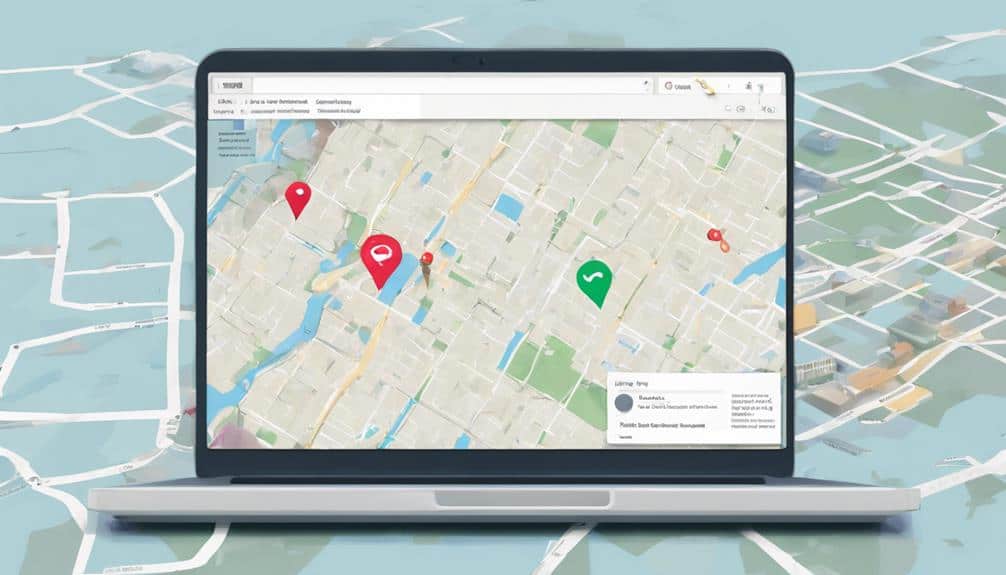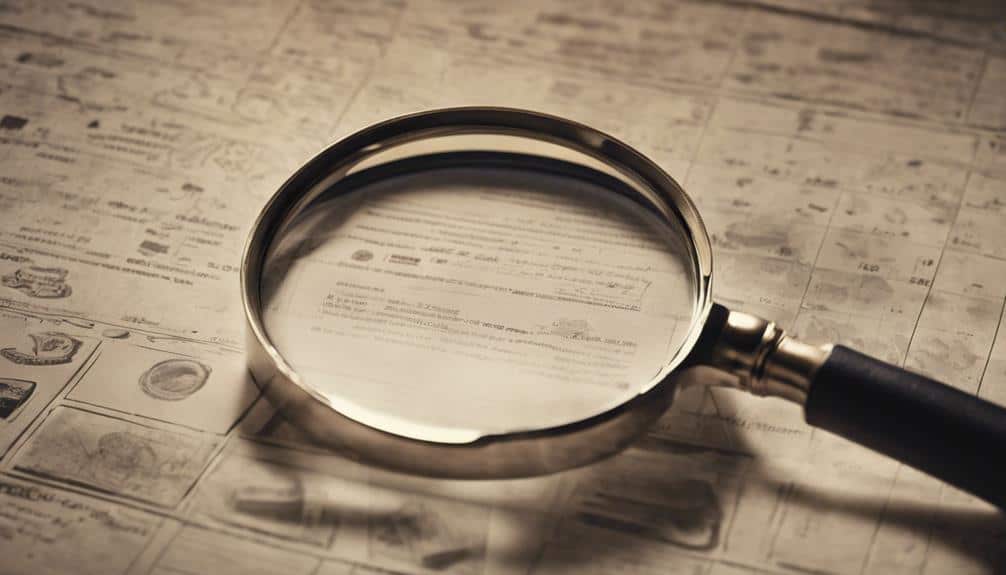You can access public property records to uncover the identity of a property owner. In the United States, these records are typically maintained by the county government, making it possible for you to search and retrieve information on property ownership. You can search online databases, utilize property owner lookup tools, or visit the County Clerk's office to access financial records related to property ownership. By searching public property records, you'll uncover information on property ownership, including owner names, addresses, assessed values, and tax exemptions. Now, uncover more details about the property's history and ownership trail.
Key Takeaways
• Utilize online property databases, like the Harris Central Appraisal District website, to access property ownership information for free in Texas.
• Visit the County Clerk's office to access financial records related to property ownership, including deeds and mortgages.
• Conduct a property deed search at the county clerk's office to uncover the current owner's information and ownership history.
• Use online lookup tools, such as the Harris Central Appraisal District website, to search for property ownership information by tax ID, address, or owner name.
• Access property tax information through the county appraisal district or the Property Tax Assessor-Collector website to find details on assessed value, tax exemptions, and tax rates.
Searching Public Property Records
You can access real property records at the Harris Central Appraisal District in Houston, Texas, where you can search for property ownership details using the owner name search feature on the HCAD website. This convenient online tool allows you to retrieve information on property ownership, including owner names, addresses, assessed values, and tax exemptions. You can verify property ownership by searching with a tax ID, property address, or owner name.
In addition to the HCAD website, you can also visit the County Clerk's office to access property records. The County Clerk maintains financial records related to property ownership, including Deeds of Trust, Warranty Deeds, tax liens, mechanics liens, and judgments. These records provide valuable information on property ownership, mortgages, and other financial obligations.
Property Owner Lookup Tools

When searching for property owner information, online lookup tools can streamline the process, providing quick access to details on ownership, property history, and tax information. One such tool is the Harris Central Appraisal District website, which allows you to search for property owner information by owner name. You can access property records that provide ownership details, property address, assessed value, tax exemptions, and lot statistics.
In Texas, you can utilize county resources to find the owner of a property for free. You can search by tax ID, address, or owner name to find the information you need. The county district clerk maintains financial records, including Deeds of Trust, tax liens, and judgments related to property ownership. These records can provide valuable insights into a property's history and current ownership.
When using property owner lookup tools, you'll typically have search options such as tax account number, property address, or owner name. These tools can save you time and effort, providing instant access to real property information. By leveraging these resources, you can quickly and easily find the information you need to make informed decisions about a property.
Whether you're a real estate professional, investor, or simply a curious individual, property owner lookup tools can help you uncover the information you need to succeed.
Online Property Databases

Online property databases, such as the Harris Central Appraisal District website, offer a convenient and efficient way to access property ownership information, providing instant access to property records, ownership history, and assessed values. By utilizing these online databases, you can quickly find out who owns a property, making it an essential tool for your research.
You can search for property owners by entering the owner's name, making it convenient to find ownership details. These online databases provide a wealth of information, including property records, ownership history, assessed values, and other relevant details. This digital access saves you time and resources, allowing you to focus on other aspects of your research.
One of the significant advantages of online property databases is their ease of use. You can access property ownership information from the comfort of your own home or office, eliminating the need to physically visit the County Clerks office or Appraisal District. This streamlined process allows you to quickly gather information, making it an essential tool for anyone looking to find out who owns a property.
Accessing County Records Office

As you prepare to access county records, you'll want to plan your visit to the County Clerk's office, taking note of their office hours and location.
You'll need to know when and where to go to initiate your record search process.
Record Search Process
You can obtain property ownership records by visiting the county records office where the property is located. This is the most reliable way to get accurate information about a property's ownership history. When you arrive, simply request property ownership information using the property address or owner's name. The county records office maintains a vast repository of deeds, mortgages, and other property-related documents that can help you uncover the history of a property.
Here's what you can expect to find in the county records office:
| Document Type | What You'll Find |
|---|---|
| Deeds | Ownership transfer records, property descriptions |
| Mortgages | Loan agreements, lender information |
| Property Records | Historical data, ownership changes |
| Liens | Outstanding debts, creditor information |
Office Hours and Location
Once you've gathered the necessary information about a property's ownership history, it's time to plan your visit to the county records office, knowing exactly where to go and when to show up.
For Harris County residents, the Real Property Department is located at 201 Caroline, Suite 320, Houston, TX 77002. You can access county property records from Monday to Friday between 8:00 AM and 4:30 PM. Alternatively, you can visit any Annex Location within Harris County during their operating hours.
Before heading out, it's a good idea to contact the Real Property Department at (713) 274-8680 to confirm their hours and availability. If you need technical support regarding property record access, you can email help@cco.hctx.net for assistance.
Remember to respect copyright laws and 'Rights Reserved' when accessing property records, including deeds.
The county records office is a valuable resource for uncovering property use and ownership history. By knowing the office hours and location, you'll be well-prepared to find the information you need.
Property Deed and Title Search

Conducting a property deed search at the county clerk's office allows you to uncover the current owner's information, providing an essential starting point for your investigation. You'll be able to find the property deed or title online through county records or third-party websites. This document typically includes the legal description of the property and the names of the current and previous owners.
A title search can reveal even more valuable information, such as ownership history, liens, and encumbrances on the property. By cross-referencing the information from the deed with other public records, you can verify property ownership and get a comprehensive picture of the property's history.
To get started, you'll need to know the property's address or legal description. With this information, you can search online or visit the county clerk's office in person. Be prepared to provide detailed information about the property, and be patient, as the search process may take some time.
Remember to carefully review the documents you uncover, as they may contain vital details about the property's ownership and history. By conducting a thorough property deed and title search, you'll be well on your way to uncovering the information you need to find out who owns a property.
Obtaining Property Tax Information

Now that you've explored property deeds and titles, you'll want to access property tax information, which can be important in your search for property ownership.
You can usually find this information through the county appraisal district or the Property Tax Assessor-Collector website.
Tax Records Search
You can access property tax records through the county appraisal district, which provides a wealth of information about a property, including its assessed value, tax exemptions, and tax rates. This is a valuable resource for finding out who owns a property, as it offers a range of details that can help you in your search.
You can search for property tax records using various options, including:
- The tax account number
- The property address
- The owner's name
These search options make it easy to access detailed property tax information.
You can also find detailed property tax bills on the Property Tax Assessor-Collector website, which can provide further insight into the property's tax history.
Keep in mind that the process of obtaining property tax information may vary slightly depending on the specific county in Texas.
Online County Records
Through online county records, you can conveniently access property tax information, including assessed values, exemptions, and tax rates, directly from the comfort of your own home or office. You can visit the Property Tax Assessor-Collector website for your specific county to find the information you need. Typically, you can search by tax account number, owner's name, or property address to access property tax details.
Here's a breakdown of what you can expect to find:
| Search Option | Information Provided | Availability |
|---|---|---|
| Tax Account Number | Assessed value, exemptions, tax rates | Specific county websites |
| Owner's Name | Property tax details, tax bill information | County appraisal district websites |
| Property Address | Detailed property tax bill information | County government websites |
Property Tax Bills
By examining a property tax bill, you can uncover valuable information about the property's ownership, assessed value, exemptions, and tax rates. This document provides a wealth of information that can help you understand the financial aspects of a property and its ownership history.
Here are some key details you can find on a property tax bill:
- Property owner's name and address: Verify the property owner's identity and contact information.
- Assessed value and exemptions: Understand the property's value and any exemptions that may apply.
- Tax rates and payment history: Review the property's tax rates and payment history to identify any potential issues.
- Tax account number and payment deadlines: Find the tax account number and deadlines for payment to make timely payments.
Keep in mind that the process of accessing property tax information may vary depending on the county where the property is located. You can usually find this information on the county's Property Tax Assessor-Collector website by searching with the tax account number, owner's name, or property address.
Reviewing Property Assessment Data

Reviewing property assessment data provides a wealth of information, including the current owner's name, mailing address, and other essential details that can help you verify ownership and gain insight into the property's value and tax status. This data is typically accessible through the local county appraisal district or online property search tools. By reviewing property assessment data, you can identify the current owner of a property and gain a better understanding of its value and tax status.
Here's an example of what you might find in property assessment data:
| Property Detail | Description | Example |
|---|---|---|
| Owner's Name | Current owner's name | John Doe |
| Mailing Address | Owner's mailing address | 123 Main St, Anytown, USA |
| Assessed Value | Estimated value of the property | $250,000 |
| Tax Exemptions | Any exemptions applied to the property | Homestead Exemption |
Using Property Mapping Tools

You can further investigate property ownership by utilizing property mapping tools, which provide a visual representation of land parcels and ownership information. These innovative tools allow you to explore property boundaries, ownership records, and related data in a user-friendly and interactive way.
Here are some key benefits of using property mapping tools:
- Visualize property boundaries: Get a clear understanding of property lines, shapes, and sizes.
- Access ownership records: Retrieve information on property owners, including historical ownership data.
- Analyze property relationships: Identify adjacent properties, neighboring owners, and related land parcels.
- Efficient research: Quickly access property data, tax assessments, and other relevant information in one place.
Finding Property Owner Information

To uncover the identity of a property owner, start by accessing the local county appraisal district or tax assessor's office, where you can search property ownership records using the owner's name, property address, or tax ID number. You can also look up property ownership details on the county's official website or in person at the county records office.
Here's a breakdown of the resources you can use to find property owner information:
| Resource | Description |
|---|---|
| County Appraisal District | Search property ownership records using owner's name, property address, or tax ID number |
| County Website | Access property ownership details online |
| County Records Office | Visit in person to access property ownership records |
Remember to verify property owner information for accuracy and update any changes through official records. You can also utilize online resources or databases provided by the county for convenient access to property owner information. By following these steps, you'll be able to uncover the identity of a property owner and access the information you need.
Researching Property History Reports

When researching property history reports, you'll need to conduct a thorough property record search to uncover detailed information on past owners and ownership changes.
You can access these records online or through county records, which will provide valuable insights into the property's history.
Property Record Search
Conducting a property record search through the Harris Central Appraisal District website allows you to access a wealth of information, including property history reports that provide detailed insights into ownership changes, tax assessments, and exemptions. This online tool is a valuable resource for finding out who owns a property.
By utilizing the website's search feature, you can efficiently locate property records based on the owner's name. Here are some benefits of conducting a property record search:
- Verify property ownership details, including owner names and addresses
- Access property history reports to gather relevant details such as ownership changes, tax assessments, and exemptions
- Utilize the convenient owner name search tool to confirm accurate and up-to-date property ownership information
- Research property history reports to uncover valuable information about a property's past
Online Document Access
Your online document access allows you to explore property history reports, uncovering a wealth of information about a property's past, including ownership changes and transaction details. With just a few clicks, you can access a treasure trove of information about a property, including its ownership history, sale prices, and property taxes. This convenient online access enables you to research property history reports efficiently, saving you time and effort.
Online platforms provide searchable databases for property history reports and ownership details, making it easy to find the information you need. You can quickly access property ownership records, historical records, and transaction details, giving you a detailed understanding of a property's past. By utilizing online document access, you can efficiently find out who owns a property, making it an invaluable tool for your research.
With online document access, you can uncover the secrets of a property's past, empowering you to make informed decisions.
Contacting Local Government Offices

Contact your local government offices, such as the county clerk's office or appraisal district, to uncover valuable information about a property's ownership. These offices are treasure troves of information, and their records can help you find the answers you're looking for.
You can start by visiting the office in person or giving them a call. For instance, if you're looking for property ownership information in Harris County, Texas, you can contact the Harris Central Appraisal District at (713) 957-7800 or visit their office at 13013 Northwest Freeway, Houston, Texas 77040-6305.
Here are some ways you can utilize local government offices to find property ownership information:
- Visit the office in person to access property records, including ownership details
- Utilize their website's search feature to find property ownership information based on owner names
- Contact the office via phone to ask about property ownership information
- Access property records, including ownership details, through the county clerk's office
Remember to verify property ownership by searching public records maintained by the county where the property is located. By contacting local government offices, you'll be well on your way to uncovering the information you need about a property's ownership.
Can I Use Brass Knuckles to Defend My Property?
There are legal restrictions on getting a permit for brass knuckles for self-defense. In some places, possession of brass knuckles is illegal and could result in criminal charges. It’s important to research the laws in your area before considering using them to defend your property.
Understanding Property Ownership Documents

After uncovering the property owner's identity through local government offices, you'll need to examine the property ownership documents that legally establish their claim to the property. These documents, such as deeds, are legal instruments that transfer ownership of real estate from one party to another. Recorded in county records, they provide a public record of property ownership, ensuring transparency and accountability.
Different types of deeds, like warranty deeds and quitclaim deeds, convey varying levels of ownership interest. Understanding the nuances of these documents is essential for verifying ownership, conducting real estate transactions, and resolving disputes. By accessing property ownership documents, you can identify the current owner of a property and track ownership history over time.
As you explore these documents, you'll gain insight into the property's ownership structure, including any liens, mortgages, or other encumbrances. This information is crucial for making informed decisions when buying, selling, or investing in a property.
Frequently Asked Questions
How Do I Find the Owner of a Specific Property?
You're curious about who owns a specific property. To find out, you can start by searching online for the Harris Central Appraisal District website. Enter the property address or owner's name, and you'll get access to the property records.
If you need more help, give them a call at (713) 957-7800 or visit their office. You can also try searching through the county district clerk's office for more detailed records.
How Do I Look up a Property Owner in Texas?
You're in Texas, and you need to uncover the mystery of a property owner's identity. You're not alone – many have walked this path before you.
To look up a property owner in Texas, you can search the county appraisal district or tax assessor-collector's office using the property address, owner's name, or tax ID. This will give you access to detailed ownership information, including property tax records and legal documents.
Are Deeds Public Record in Texas?
You're wondering if deeds are public records in Texas. The answer is yes, they are!
In Texas, deeds are considered public records, which means you can access them. These records are maintained at the county level, and the County Clerk's offices are responsible for recording and managing them.
As a public record, you can review deeds to uncover information on property ownership, transfers, and legal rights.
How to Look up Liens on a Property in Texas?
You can easily look up liens on a property in Texas by searching county records or contacting the county clerk's office. They maintain records of liens, including mortgage, tax, judgment, and mechanic's liens.
You'll need to know the property's location and owner's name to access the records. You can visit the county clerk's office in person, search online, or mail a request to obtain the information.
Be thorough, as uncovering existing liens is vital for making informed real estate decisions.
Conclusion
You've finally dug up all the dirt on that mysterious property owner! It's like finding a needle in a haystack, but you did it!
You've scoured public records, property databases, and county offices, and now you've got the goods.
You've uncovered the property's entire history, from deeds to titles, and maybe even some surprising secrets.
Congratulations, you're now a master property sleuth!


